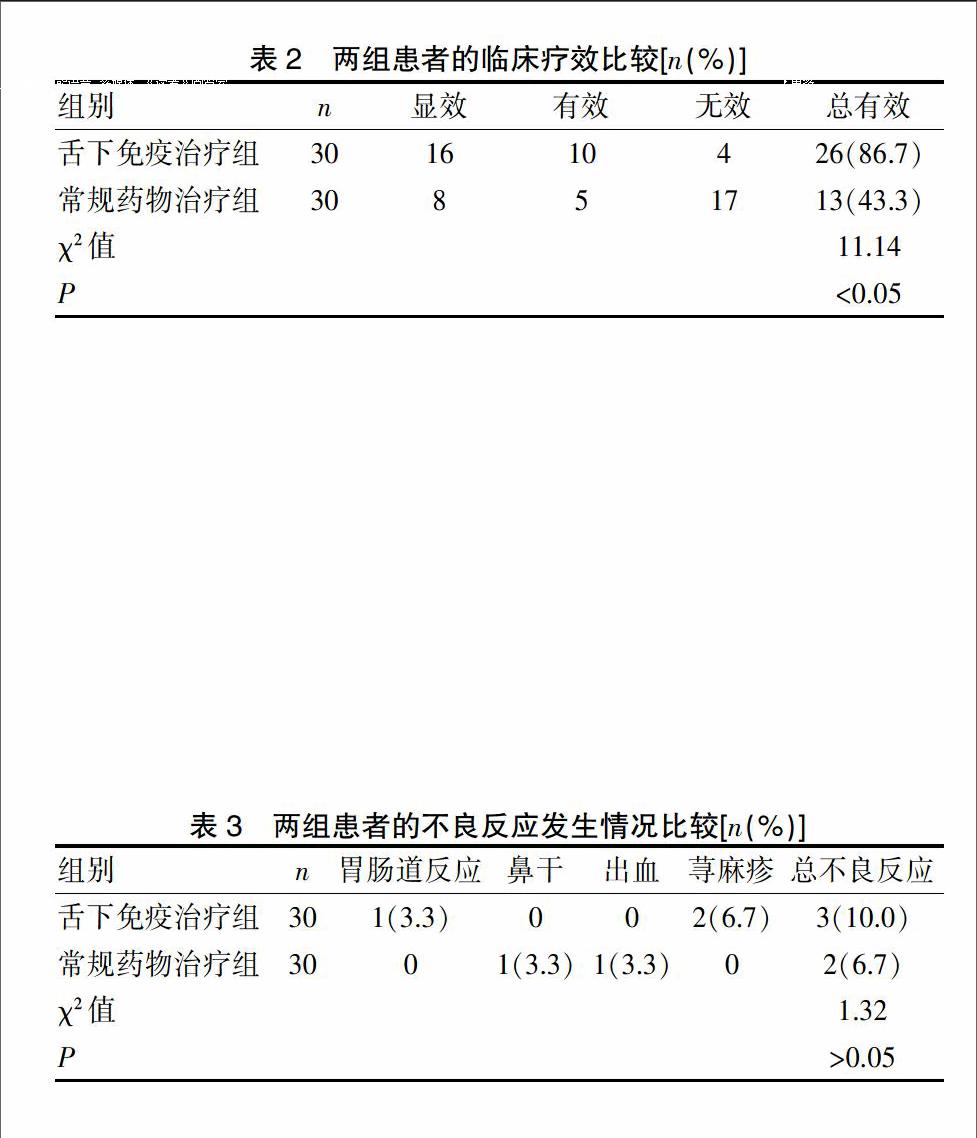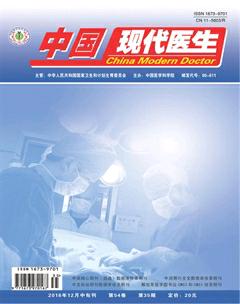常规药物和舌下免疫治疗变应性鼻炎的疗效分析
胡晓勋++刘季萍++付书彩


[摘要] 目的 探讨常规药物和舌下免疫治疗变应性鼻炎的疗效。 方法 选取我院2013年6月~2014年6月收治的变应性鼻炎患者60例,依据治疗方法将这些患者分为个体化规范化的舌下免疫治疗组(n=30)和常规药物治疗组(n=30)两组,对两组患者的临床症状评分、临床疗效、不良反应发生情况进行统计分析。结果 舌下免疫治疗组患者的鼻塞、鼻涕、鼻痒、喷嚏评分及总分均显著低于常规治疗组(P<0.05),治疗总有效率[86.7%(26/30)]显著高于常规药物治疗组[43.3%(13/30)](P<0.05),但两组患者不良反应发生率之间差异不显著[10.0%(3/30)、6.7%(2/30),P>0.05]。 结论 变应性鼻炎的个体化规范化的舌下免疫治疗效果较常规药物治疗好,值得在临床推广使用。
[关键词] 变应性鼻炎;个体化规范化的舌下免疫治疗;临床症状;不良反应
[中图分类号] R765.21 [文献标识码] B [文章编号] 1673-9701(2016)35-0062-03
Analysis of therapeutic effect of conventional drugs and sublingual immunotherapy on allergic rhinitis
HU Xiaoxun LIU Jiping FU Shucai
Department of ENT, Jiujiang University Affiliated Hospital, Jiujiang 332000, China
[Abstract] Objective To compare the efficacy of conventional drugs and sublingual immunotherapy on allergic rhinitis. Methods A total of 60 patients with allergic rhinitis from June 2013 to June 2014 in our hospital were enrolled and divided into individualized and standardized sublingual immunotherapy group(n=30), conventional drug treatment group(n=30) according to the treatment method. The clinical symptom score, clinical efficacy and adverse events in the two groups were statistically analyzed. Results The scores of nasal congestion, nasal discharge, nasal itching, sneezing and the total score of these above in sublingual immunotherapy group were significantly lower than those of routine treatment group(P<0.05). The total effective rate was 86.7%(26/30), which was significantly higher than that of the conventional drug treatment group(43.3%, 13/30)(P<0.05). However, there was no significant difference between the two groups in the incidence of adverse reactions[(10.0%, 3/30), 6.7% (2/30) (P>0.05)]. Conclusion Individualized normalized sublingual immunotherapy of allergic rhinitis is more effective than conventional drug therapy and worthy of clinical application.
[Key words] Allergic rhinitis; Individualized standardized sublingual immunotherapy; Clinical symptoms; Adverse reactions
變应性鼻炎属于一种耳鼻咽喉科疾病,在临床极为常见,相关医学研究表明[1],其达到了10%~25%的平均发病率。尘螨是变应性鼻炎的主要致敏原[2]。现阶段,药物治疗、特异性免疫治疗是临床治疗该病过程中常用的方法[3],其中临床普遍认为[4],特异性免疫治疗是唯一的有效对因治疗方法,其对变应性疾病自然进程改变途径为通过免疫调节机制。本研究比较了变应性鼻炎个体化规范化舌下免疫治疗与常规药物治疗的效果,发现前者较后者具有显著优势,现报道如下。
1 资料与方法
1.1 一般资料
选取我院2013年6月~2014年6月收治的变应性鼻炎患者60例,纳入标准:所有患者均符合变应性鼻炎的诊断标准[5],均具有正常的肺功能,均知情同意。排除标准:将有其他变应原疾病史、近6个月内有哮喘发作史等患者排除在外。依据治疗方法将所有患者分为个体化规范化的舌下免疫治疗组(舌下免疫治疗组,n=30)和常规药物治疗组(n=30)。舌下免疫治疗组患者中男16例,女14例,年龄5~59岁,平均(21.2±3.6)岁;病程1~36年,平均(4.6±1.2)年。常规药物治疗组患者中男15例,女15例,年龄6~59岁,平均(22.3±3.4)岁;病程2~36年,平均(4.9±1.6)年。两组患者的一般资料比较差异均不显著(P>0.05),具有可比性。

